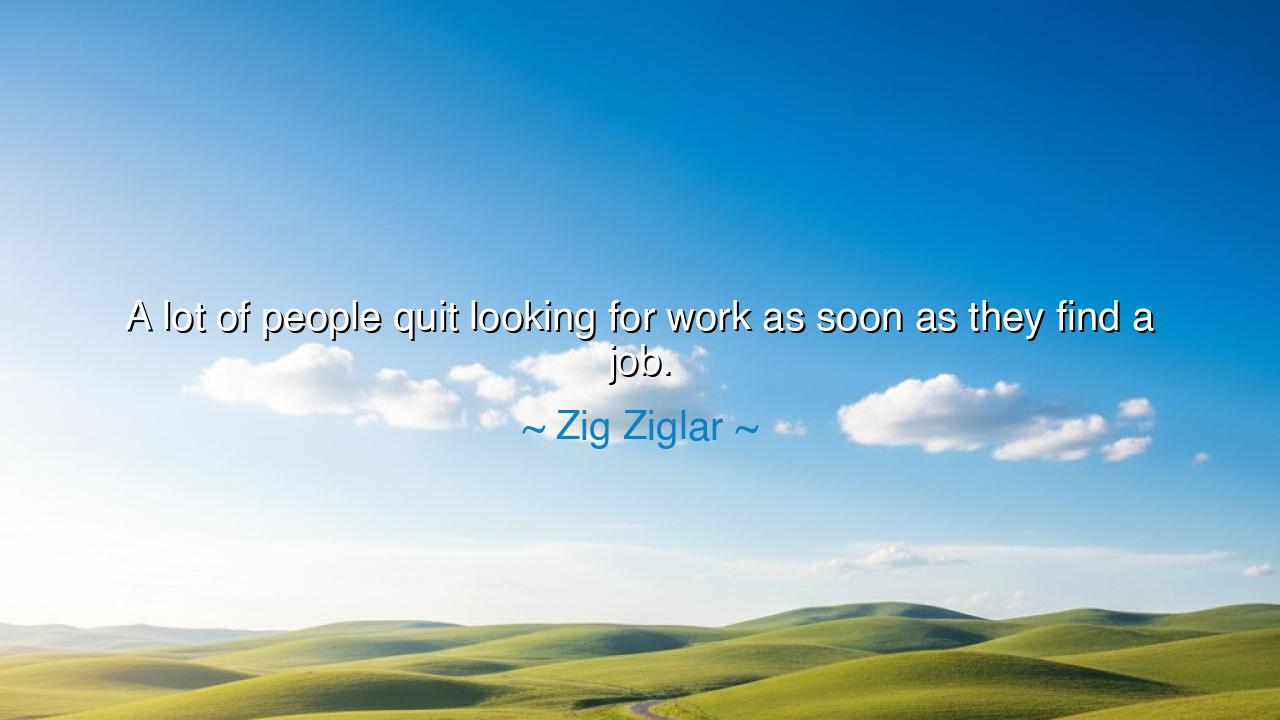
A lot of people quit looking for work as soon as they find a






Hear the witty yet profound words of Zig Ziglar, who speaks of the hidden danger in comfort: “A lot of people quit looking for work as soon as they find a job.” At first glance, these words may seem like jest, but beneath them lies a timeless lesson about the nature of growth and purpose. Ziglar reminds us that there is a great difference between labor that merely sustains life and work that gives life meaning.
A job is a place of duty, where tasks are done and wages earned. It feeds the body and provides stability, but it does not always nourish the soul. True work, however, is the calling that springs from within — the pursuit of excellence, mastery, and service to something greater than oneself. Many, when they secure a job, grow content and cease to strive for more, mistaking survival for fulfillment. In doing so, they trade the fire of ambition for the dull safety of routine.
Ziglar’s words carry a warning for the generations. To stop seeking work when a job is found is to let one’s spirit fall into slumber. For while a job ends with the ringing of the day’s bell, work is unending, stretching beyond time and place. It is the labor of self-improvement, the constant search to grow, create, and leave behind a legacy of worth. To forsake this quest is to live half a life, rich in coin but poor in purpose.
This teaching has roots deep in the past. The ancient craftsmen, warriors, and philosophers understood that their daily tasks were but reflections of an inner journey. The potter shaping clay was also shaping his own soul; the scribe recording wisdom was also recording his own growth. They knew that while a position or role could be given or taken away, work was eternal and self-chosen.
Let future generations remember this truth: never confuse a job with a life’s work. Even when your hands are bound to the duties of the day, let your heart remain restless, seeking to rise higher. For when the body labors and the soul strives together, the life of a person becomes more than survival — it becomes a creation worthy of the ages.






MTMinh Thu
This quote seems to reflect a common mindset where once a job is secured, people stop looking for better opportunities. But why is that the case? Shouldn’t we always aim for better, whether it's a job, lifestyle, or personal growth? How many of us have stayed in a job that isn’t ideal simply because it’s comfortable? Zig Ziglar’s quote challenges us to reconsider how we view job security and continuous growth.
TVThuyThanh Vo
Zig Ziglar’s quote really got me thinking—why do so many people stop looking for work after they land a job? Is it because they feel the pressure to just settle, or because they’re satisfied with the security of the job they have? Maybe there’s a balance between feeling grateful for what we have while still keeping an eye open for new opportunities. Shouldn’t we always be striving to improve our situation, even after securing employment?
BANguyen Huynh Bao Anh
This quote makes me reflect on the nature of ambition and job satisfaction. It seems that when many people finally secure a job, they feel a sense of relief and stop pursuing other opportunities. But does this mean they’ve given up on personal growth and progress? Could it be that we should always strive for better and keep pushing for opportunities, even once we have a job, to truly grow in our careers?
VQHuynh Viet Quang
Zig Ziglar's quote is eye-opening and a bit unsettling. It makes me think about how many people settle for the first job they get, perhaps out of desperation, but then stop pushing for better opportunities. Could this mindset be why so many people stay in jobs that don’t fulfill them or offer much room for growth? Is it fear, comfort, or a lack of vision that stops people from continuing to search for work that aligns with their passions and goals?